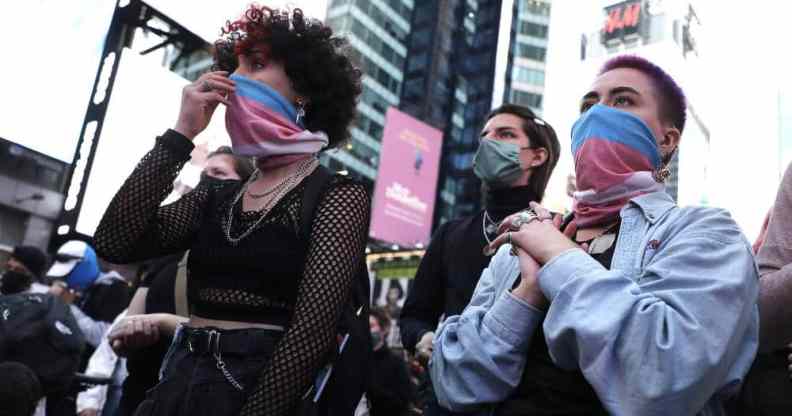Transphobic violence got less than an hour of TV news coverage in 2020. It was the deadliest year on record

Protesters listen to speeches and express their emotion in Times Square during the demonstration. Demonstrators gather in Times Square to demonstrate against the shooting of Roxanne Moore, a transgender woman. According to the Pennsylvania police, Moore a mentally ill woman, was shot 16 times while brandishing a gun in public. (Photo by John Lamparski/SOPA Images/LightRocket via Getty Images)
American news outlets spent less than an hour covering anti-trans violence in 2020, despite it being the deadliest year on record for the trans community.
At least 44 transgender or gender non-conforming people died in 2020 by violent means, the majority being trans people of colour. The Human Rights Campaign (HRC), which has been tracking reports of anti-trans violence for the past several years, said it had never “seen such a high number” of violent and senseless trans deaths as it had in 2020.
However, analysis of broadcast and cable TV news in 2020 by Media Matters found networks discussed anti-trans violence for only 54 minutes across 23 segments. The analysis looked at new shows across major news outlets in the US including ABC, CBS, NBC, CNN, Fox News and MSNBC.
Cable networks (CNN, Fox News and MSNBC) covered anti-trans violence for 41 minutes in 2020, while broadcast networks (ABC, CBS and NBC) covered it for 13 minutes.
Reports from MSNBC accounted for more than half of the total coverage of anti-trans violence across all platforms in 2020. The network dedicated 31 minutes across segments.
Every other network covered the topic for six minutes or less.
Only nine segments mentioned the name of a slain trans person.
Nine out of the total 23 segments, only 39 per cent, actually named the trans person who was murdered. Of these 23 segments, just over half (15) featured a guest who was trans or gender non-conforming.
During LGBT+ Pride Month in June, broadcast and cable TV news networks’ on-air coverage of anti-trans violence jumped to 29 minutes, but then largely failed to cover the issue the rest of the year.
Robbie de Santos, associate director of communications and campaigns at Stonewall, told PinkNews all LGBT+ people should be able to “live their lives safely and be free from violence, abuse, harassment and attacks”, but, even “in 2021, this is still not the case”.
“Trans people in particular face extreme risks to their safety, simply for being themselves,” de Santos said. “While trans communities are an almost constant focus of the media globally, it is concerning that only 54 minutes of US broadcast coverage addressed the issue of violence towards trans people during 2020, and we know that there is a similar trend among the UK media.”
“We hope this will be a reminder to the media industry as a whole to make sure they are working with LGBT+ communities to tell our own stories, and help highlight the very real challenges that our communities are still facing today,” he said.
Under reporting or misreporting on anti-trans violence is a global issue.
HRC added the 44 deaths reported in 2020 might not encompass all of the violence against the trans community because many stories go unreported or misreported.
At least 350 trans and gender non-conforming people were murdered globally between the beginning of October 2019 and the end of September 2020, according to Transrespect Versus Transphobia Worldwide, a research arm of the advocacy network Transgender Europe. The majority of the murders occurred in Brazil (152), Mexico (57) and the US (28).
The total represents a six per cent increase in reported murders from their count in 2019, when 331 trans and gender non-conforming people lost their lives due to hate violence.
Ugla Stefanía Kristjönudóttir Jónsdóttir, known as Owl, a consultant for trans charity Mermaids, told PinkNews the research reflects how society and the media is often “unwilling to acknowledge and contemplate about the violence transgender people face and how they might contribute to that – not just in the US but worldwide”.
Jónsdóttir explained: “A lot of media coverage around trans people centres around painting trans people as a problem in society, when in fact the most pervasive and serious problem is the discrimination and violence we face in our day to day lives.”
She said hate crimes against trans people in the UK “got shockingly little media coverage”, despite being very serious and the “direct result of transphobia that’s facilitated by the media”. Jónsdóttir said society and the media shouldn’t shy away from these topics because it will “help us address the problems that are in society and how we can combat them”.
“We need a serious conversation on how we can make our society more safe for everyone,” Jónsdóttir explained. “That’s something every person in our society deserves, and it will help facilitate a more inclusive, informed and compassionate society.”

